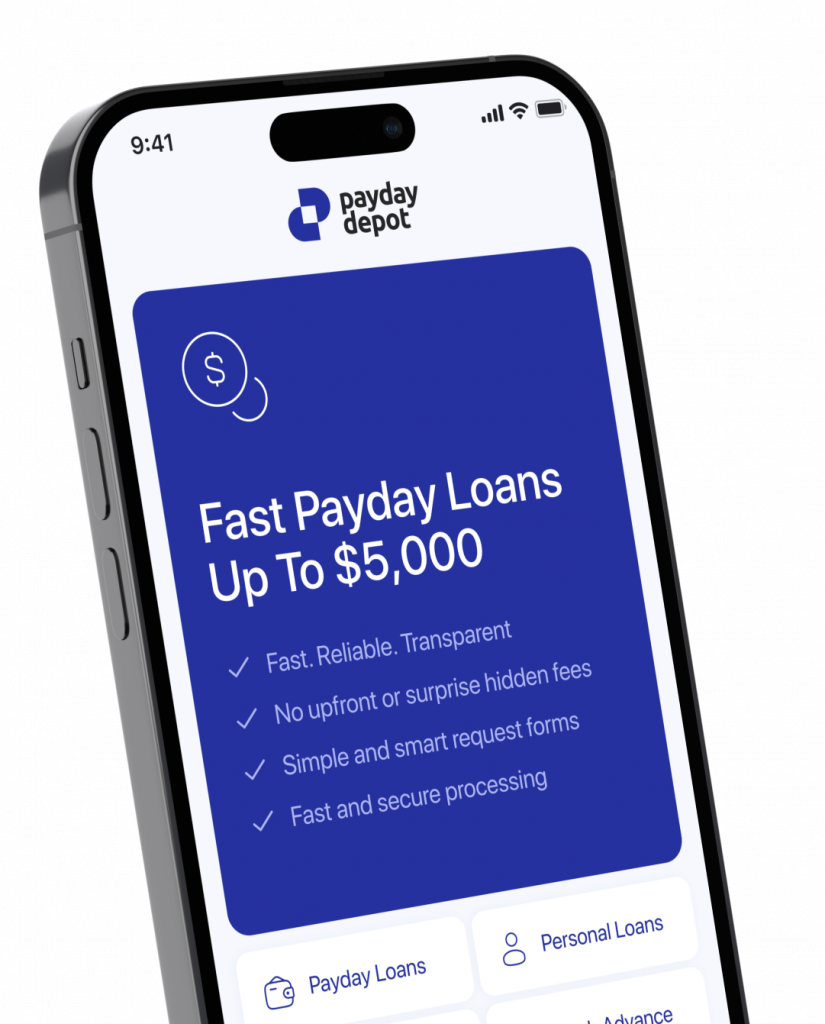Lorien Strydom, a finance and law graduate, augmented her skills with courses in content marketing, digital marketing. Her articles, featured on The Balance, showcase her expertise and leadership in the industry. With over 16 years of experience, she covers diverse topics in finance and commerce. Lorien founded JLT Creative, specializing in content for e-commerce and fintech. Read more
Best Payday Loans Near You
When it comes to financial emergencies, payday loans can be a fast and easy solution for most borrowers. They can fill the financial gap between paychecks, enabling you to cover any unforeseen expenses throughout the month, such as an emergency medical cost or auto repair.
With around 12 million Americans taking out payday loans every year, it’s estimated that 20% of borrowers default on their loans. In addition to this, payday lending is expected to reach USD 42.6 billion by 2028, according to a research report by Vantage Market Research.
Even though it’s easier to qualify for payday loans than other personal loans and credit cards, it’s important to understand how payday loans work, what to look out for when comparing lenders, and where to get the best deals.
Let’s take a closer look at how payday loans work, and how to get a payday loan near you.
How Do Payday Loans Work?
Payday loans are small short-term loans that are designed to provide a quick cash solution to borrowers until their next payday. The application process is usually simple and can be completed online; once approved, the loan amount is typically deposited directly into your bank account.
Your loan amount is typically based on your monthly income. Once approved, you will receive the funds directly to your bank account typically within one day. Make sure that you understand the repayment terms of the loan, including the loan amount, fees, and due date.
Payday loans are typically due within a few weeks, along with the interest and fees that the lender charges. The interest rates on payday loans are typically very high, making payday loans a solution for urgent short-term expenses; they’re not a solution for long-term credit or an impromptu vacation to Hawaii.
If you miss a payment, payday lenders can charge you a late fee that can make your total loan balance increase. This is why you need to make sure you can afford to repay on time, to avoid your payday loan becoming a very expensive way of borrowing money.
It’s also important to note that payday loans may not be available in your home state. Payday lending is illegal in 12 states, although many other states allow short-term lending with restrictions.
These state-determined regulations were set in place to protect borrowers, and can include limiting fees and the interest rates lenders may charge. These regulations may include caps on loan amounts, maximum finance charges, and restrictions on the number of loans a borrower can take out within a certain period.
Credit Checks
Payday lenders don’t typically consider credit scores when processing loan applications, as they have the authority to debit the repayment directly from your bank account. It’s their way of minimizing their risk.
This lack of credit evaluation requirements is one reason why payday loans are so popular, especially among borrowers who don’t have good credit. Payday lenders have less strict eligibility requirements than traditional lenders like banks.
Rates and Fees
You might imagine that your rate of interest for a no-credit-check loan would hover between 10% and 30%. But this is not true. Payday lenders often don’t provide an APR (Annual Percentage Rate). Instead, they impose a borrowing fee, otherwise known as a finance charge, which typically ranges from $10 to $30 for every $100 borrowed.
Payday loans typically have terms of 15 to 30 days. Even while you may only be paying 10% to 30% of the amount you borrow on a monthly basis, the compound interest on the amount you owe leads to APRs of 300% to 600% when calculated on an annual basis. So always be aware of the terms you’re agreeing to before signing a payday loan contract.
Example: Let’s take an average payday loan amount of $375. If the finance charge is $15 per $100 borrowed, interest will be a total of $56.25. This means the total repayment amount is $431,25.
The Truth in Lending Act (TILA) requires all payday lenders in the U.S. to disclose their finance charges as people often overlook them and end up with expensive debt. This includes information about the APR, finance charges, the total amount financed, payment schedules, and any other relevant terms and fees. These disclosures must be provided to consumers before they become obligated for credit.
While TILA establishes federal standards, individual states may have additional consumer protection laws that apply to credit transactions within their jurisdictions.
Repayment
If you can’t pay your payday loan on time, you can ask your lender to “roll over” the loan. If allowed, you can just pay the fees due for the repayment and extend the loan for another period. But keep in mind that interest will continue to grow and so will the finance charges.
If you take the loan example of $375 above, the total repayment amount is $431.25. If you roll over the loan, the new amount will now be $495.94. This includes the new finance charge of $64.69.
This is why payday loans can be a great way to bridge a gap only if you can afford to pay it back.
Who Uses Payday Loans?
With millions of consumers taking payday loans every year, a recent study on payday loans showed that 69% of borrowers use payday loans to cover expenses like rent, bills, mortgages, and student loans.
Studies also show that payday loans are more popular among urban consumers than rural consumers and that many people who take out these loans are members of the armed forces. Payday loans can be helpful to anyone with a stable income who needs to cover a financial emergency.
Payday loans are also an alternative to other types of loans, especially if you just need money for a short time period and don’t want to take out large amounts of debt.
How To Find the Best Payday Loans Near Me?
When searching for payday loans near you, it’s important to do thorough research to find reputable lenders with fair terms and transparent lending practices.
Check online reviews and ratings for different lenders to gauge their credibility and customer satisfaction. Consider asking for recommendations from friends or family who may have had previous experiences with payday loans.
You can use our loan comparison to compare lenders and find the best payday loan offer for your needs.
Here are some steps to help you find the best payday loan options:
Research Online
Start by searching online for reputable payday loan providers in your area. Read customer reviews and testimonials to gauge their credibility and customer satisfaction levels.
Check Licensing and Regulations
Verify if the payday loan provider is licensed and operates legally in your state. Each state has specific regulations and limits on payday loans, ensuring consumer protection.
Compare Interest Rates and Fees
Pay close attention to the interest rates and fees charged by different lenders. Compare these rates to select the most affordable option that fits your financial situation.
Transparency and Customer Support
Choose lenders who prioritize transparency in their terms and conditions. Look for those who offer excellent customer support, clear repayment structures, and readily available information.
How Much Can I Borrow With a Payday Loan?
Payday loans are designed to provide small amounts of money to cover short-term financial needs. The typical amount borrowed in payday loans is between $100 and $1,000. But this can vary between lenders and depends on several factors, like state regulations and your income level.
You should never borrow the full amount if you don’t need it, as this habit can lead to more debt than is necessary. Payday loans can come with high interest rates and other fees, which quickly add up. Only borrow what you truly need in order to meet your immediate financial needs, and take into account your ability to pay back the loan according to the terms that the lender offers you.
Remember that loan limitations and regulations may change depending on the state you live in. Payday loan amounts are capped in some areas, while others may place restrictions based on a percentage of your income. Always review the laws particular to your state.
Before approving your application, responsible lenders will also evaluate your income and capacity to repay the loan. They may base the loan amount they are ready to lend you on elements like your monthly income, spending, and any outstanding debts.
Payday loans should not be used as a long-term financial plan, since they are intended to be temporary fixes. Borrow sensibly: just take out what you can afford to pay back. And, if at all possible, consider other options like personal loans, credit cards, or assistance from friends and relatives.
Pros and Cons of Payday Loans
As with any loan product, payday loans have advantages and disadvantages. Let’s take a closer look at the pros and cons of payday loans:
Pros
- Fast turnaround time: Applying for a payday loan online takes a few minutes. And in some cases, you can even have the funds paid to your bank account within the same day.
- Easy application process: Payday loans have fewer eligibility criteria than traditional personal loans. You typically only need proof of identification, employment details, and a bank account.
- No credit check: Unlike a credit card or personal loan, most payday lenders don’t do a credit check when approving you for a payday loan.
- Offers a fast solution: Can be a temporary solution for financial emergencies and offers an alternative to taking out a personal loan or credit card.
Cons
- Higher interest rates: One drawback of payday loans is that they come with high fees and interest rates, which can lead to a vicious cycle of debt if not managed properly.
- Shorter repayment: Payday loans come with short repayment terms, usually within a few weeks.
- Smaller loan amounts: Payday loans are based on your income and typically come with limited loan amounts compared to traditional bank loans.
- Lender reputations: Some lenders have a reputation for predatory lending practices.
Requirements for Getting an Online Payday Loan
There are no strict requirements for getting an online payday loan. All a consumer needs to get a payday loan is an open bank account in relatively good standing, a steady source of income, and identification.
Most payday lenders don’t do a hard credit check as part of their approval process, so qualifying for a loan won’t have an impact on your credit.
Here’s a recap of what lenders may require:
- You must be at least 18 years old;
- Most lenders prefer to deposit funds directly into your account and set up automatic repayment;
- Lenders may require proof that you can repay the loan and this can include income from a job, benefits, or another reliable source;
- Lenders may ask for your address, phone number, and email address;
- Additional requirements may vary by lender and state.
The state you live in may have specific requirements when it comes to online payday loans, so it’s important to check whether payday lending is allowed in your state and what the limitations are.
How To Get a Payday Loan Near Me?
The first thing to do when looking for a payday loan near you is to compare lenders in your state. You can compare payday loans online to get an idea of the loan offer you may qualify for before you finalize your payday loan application.
Here’s a recap of the steps to getting a payday loan near you:
- Fill out the loan application form: Applying online, is fast, easy, and convenient. Have your income documentation and identifying information ready.
- Receive and compare offers: You may receive multiple loan offers from different lenders. Compare them based on interest rates, loan amounts, and repayment terms.
- Accept the offer. If you are happy with the terms, you can accept the loan offer. Depending on the lender, you may be required to sign a physical agreement or provide electronic consent.
- Get your money: Lenders typically deposit the loan funds directly into your bank account within 24 hours or the next business day.
Some lenders may provide cash or funds on a prepaid card, as 32 states allow for in-store lending.
Alternatives to Payday Loans
Credit Union Loans
Credit unions are nonprofit financial institutions that often provide small-dollar loans as an alternative to payday loans. These loans are designed to be more affordable and borrower-friendly.
Credit unions offer small-dollar loans with lower interest rates and longer repayment terms compared to payday loans. They typically require membership, which may involve meeting specific criteria or paying a nominal fee.
Pros:
- Lower interest rates: Credit unions generally offer loans with lower interest rates compared to payday lenders, resulting in lower overall borrowing costs.
- Longer repayment terms: Borrowers have more time to repay the loan, reducing the likelihood of falling into a cycle of debt.
- Member benefits: Credit unions often provide additional benefits to members, such as financial education programs and counseling.
Cons:
- Membership requirements: Some credit unions have membership criteria that might limit access for certain individuals.
- Application process: Credit unions may have stricter application processes compared to payday lenders, including credit checks and income verification.
- Processing time: Obtaining a loan from a credit union may take longer than getting a payday loan, as credit unions typically have more thorough application and approval processes.
Personal Loans
Online lenders, including peer-to-peer lending platforms and online financial institutions, offer personal installment loans that can serve as an alternative to payday loans.
Online lenders provide borrowers with small-dollar loans that are repaid in fixed monthly installments over a specific term. Loan terms and interest rates vary depending on the lender and the borrower’s creditworthiness.
Pros:
- Convenient application process: Online lenders often have streamlined application processes that can be completed online, making it easier and faster to apply for a loan.
- Competitive rates: Some online lenders offer lower interest rates compared to traditional payday lenders.
- Repayment flexibility: Borrowers have the option to repay the loan in fixed monthly installments, which can make budgeting more manageable.
Cons:
- Interest rates and fees: While some online lenders offer competitive rates, others may charge higher interest rates and fees, so it’s crucial to compare options.
- Potential for predatory lending: The online lending industry has both reputable and predatory lenders, so borrowers need to research and choose reputable lenders.
- Credit checks: Online lenders often assess creditworthiness, and borrowers with poor credit may face higher interest rates or loan denials.
Salary Advances
Some employers offer salary advances or loan programs as an alternative to payday loans. These programs provide employees with access to funds in advance of their regular payday.
Employees can request a portion of their earned wages before their scheduled payday. The amount is deducted from their next paycheck or repaid in installments over subsequent pay periods.
Pros:
- Access to funds: Employees can access funds quickly in case of emergencies or unexpected expenses, reducing the need for payday loans.
- No interest or fees: Employer-based loan programs may not charge interest or fees, making them a cost-effective alternative.
- Convenience and ease of use: These programs are often integrated with payroll systems, making it easy for employees to access funds when needed.
Cons:
- Employer participation: Not all employers offer salary advances or loan programs, limiting availability.
- Borrowing limits: The amount employees can access may be limited based on their income or other factors.
- Repayment constraints: Repayment terms are usually determined by the employer, and employees may have limited flexibility in determining the repayment schedule.
It’s important to note that the availability of these alternatives can vary depending on your location and individual circumstances. Before pursuing any loan option, carefully review the terms, interest rates, fees, and repayment terms to ensure it aligns with your financial needs and capabilities.



